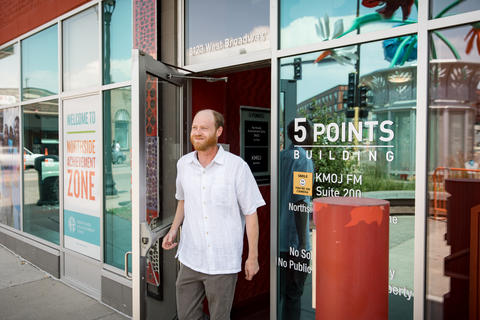
Economics for Community Decisions

If you’re interested in the future of North Minneapolis and you haven’t met Eric King yet, you will. Recently settled into his office at the Urban Research and Outreach Engagement Center (UROC), King is the new University of Minnesota Extension Educator in Community Economics. The position is a new one for Extension in the metro area, but King has years of experience with the kinds of community outreach, engagement and development he’ll be doing on the job.
King is also a North Minneapolis resident, and he’s excited to be working with people in his own community. “I grew up in Robbinsdale, but much of my family has lived on the northside for years, so after I graduated in 2013, I moved here to be closer to them and friends,” he says. “I like that I already know the community, and I don’t think I could have picked a better time to be stationed out of UROC because there’s so much going on around here right now with all the new development.”
Throughout Minnesota, Extension community economics educators conduct applied research and use existing studies and data to help communities decide what strategies to use to make the local economy stronger and more vibrant. King is part of Extension’s community economics team which includes expertise in economic impact analysis, retail trade analysis, business retention programming, and local foods markets available to North Minneapolis. In his new position, King will be collaborating with his colleagues at UROC on ideas and projects within the North Minneapolis Promise Zone.
Minneapolis is one of 13 cities the White House selected for a Promise Zone designation in 2015. Each zone receives priority status for federal grants and other support, with a goal of boosting education and employment rates and improving livability. The Promise Zone designation was a consideration when the Economic Development Administration’s regional office in Chicago decided to provide funding for this new position. “Extension’s community economics work has been going on for a long time around the state, but changing demographics mean we really need to be more active in urban areas too, so this is a step in that direction,” he explains.
King’s work on community issues began in 2013 shortly after he graduated from the University of Minnesota with a bachelor’s degree in urban studies and a minor in GIS (geographic information system), which is a system designed for gathering, managing and analyzing data in a way that communities can use. After an internship with the Minnesota Housing and Finance Agency using GIS technology to study issues related to the Neighborhood Stabilization Program, he got a graduate research assistant position at CURA, the U’s Center for Urban and Regional Affairs.
At the same time, he enrolled at the U’s Humphrey School of Public Affairs and earned his master’s in urban and regional planning. “I worked at CURA for about two and a half years while I was in graduate school, so I got to do a lot of in-depth community engagement work with numerous non-profits and public-sector agencies,” he recalls, explaining that one of the projects he enjoyed was analyzing plans for the city-owned Upper Harbor Terminal in North Minneapolis.
“People have been looking at ways to redevelop that area along the river to better connect people with it for years,” he says. Friends of the Mississippi River asked CURA to analyze some of the ideas to understand the broader environmental impact. I also did surveys and talked with people in North Minneapolis who had questions about how the development was going to benefit the community.”
King was doing a paid internship in the Urban Scholars program with Minneapolis’ Community Planning and Economic Development agency when he saw the job posting for the Extension position. He applied immediately. “I really wanted the opportunity to extend the resources of the U in a way that could genuinely benefit North Minneapolis,” he says. “I know that nothing happens overnight. I’m going to invest time and energy into this place and the people who live here, and I’m really looking forward to meeting people and hearing what they have to say about the future of the community.”